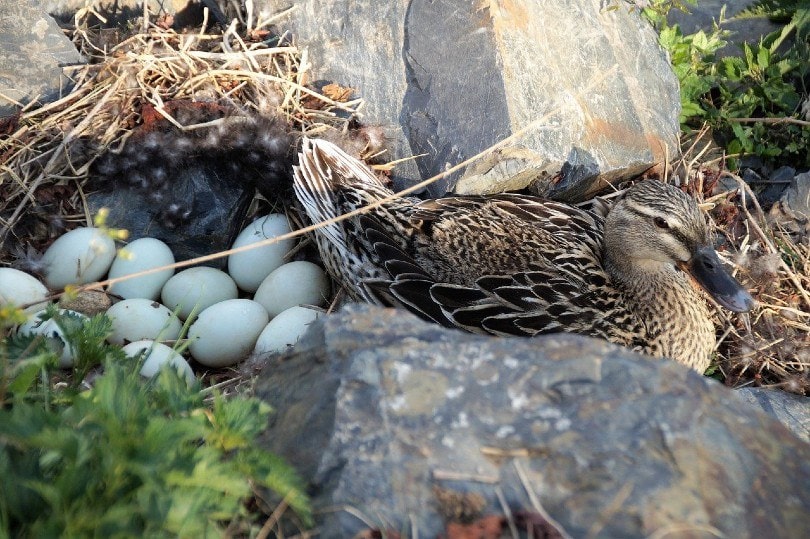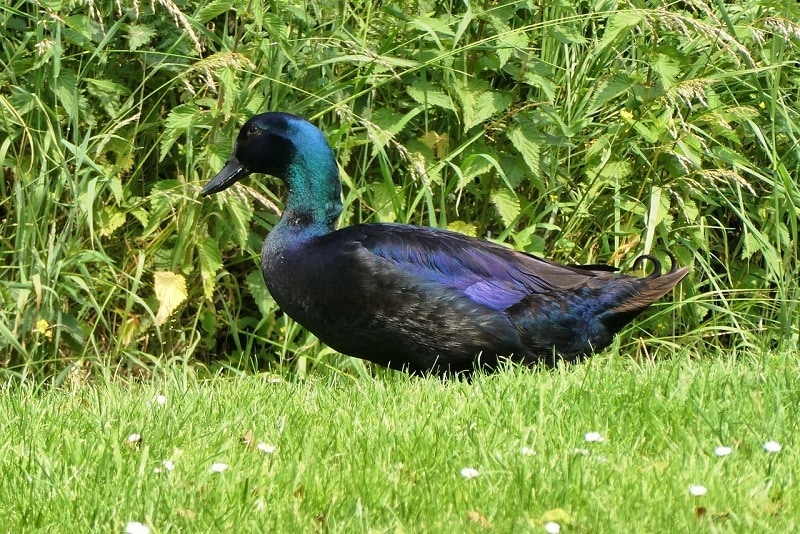When to Chicken Ducks Turkeys and Gesses Started Lay Eggs

After your fluffy duckling finally transforms into a duck and lays its first egg, the first question that may come into your mind is how often you'll see the eggs coming.
But you should understand that a duck's egg production varies tremendously depending on genetics (breed and hatchery) and management. This means that you significantly contribute to your bird's supply of eggs from the moment you buy it to how well you care for it.
Keep reading to understand what to expect about duck egg production and how to improve the egg supply.

How Often Do Ducks Lay Eggs?
Ducks begin producing eggs at 4-7 months or 16-28 weeks when they are mature and old enough to lay. However, some smaller breeds like bantams can lay earlier, at around four months, while heavier duck breeds like Muscovies begin much later when they are about six months.
Wild ducks start laying during spring, which is typically the beginning of the breeding season. However, domesticated ducks like Mallards lay seasonally and often begin producing eggs in spring regardless of their ages.
Nesting waterfowls produce an egg every 24 to 48 hours, with ducks and geese laying one egg per day while swans produce one egg every two days. However, how often a duck lays eggs depends on the species. Generally, ducks can produce a clutch size (a full set of eggs a single female lays) that ranges from three to twelve eggs, laid at an interval of one to two days.

More Than One a Day?
Everybody knows that ducks lay an egg a day, but duck owners can get one more egg the same day once in a while. It's surprising, but yes, ducks occasionally lay two eggs in a day. Although it's rare, it happens and is perfectly normal, and common especially in "first-time" ducks whose hormones are still not in order.
Usually, this is just a one-time thing. However, these extra eggs do not last long as the duck's hormones will balance out someday, and she will start laying the typical amount, an egg a day.
Do not be excited about the extra egg, though, as they are often soft-shelled because new ducks rarely have enough resources to make two shells. But if they are good quality eggs, you could be owning a "wonder duck," so enjoy them for as long as they keep coming.
What Time of The Day Do Ducks Lay Eggs?
These birds generally lay their eggs early in the morning, around sunrise-they may probably have already laid by the time you let them out of their coops. A duck can also occasionally lay in the afternoon or even evening.
Your duck may not produce an egg at a specific time every day, so it would be best to keep it inside until it's done laying if you want it to do it in its coop. However, if you let it out early, it'll lay anywhere in the yard.
Unfortunately, though, ducks can hold their eggs in until they find a particular spot to produce their eggs from.

When Do Ducks Stop Laying?
Egg production is usually higher when a duck group is smaller. However, production falls rapidly when you raise ducks commercially because ducks easily develop nervousness.
You should not house breeding ducks together in groups bigger than 250 birds if you want increased egg production and overall performance.
Generally, ducks produce eggs outperforming other poultry breeds like chickens, ranging between 7-9 years on average. However, the exact age they stop laying varies depending on the species and how hard you've been pushing them to lay.
Hens tend to slow down by their second or third year, but ducks can lay well up to eight years old or more.
It's only true that ducks that produce many eggs a year will not lay for many more years like those that produce fewer eggs per year. The reason is that ducks are born with a specific amount of all the eggs they'll ever lay throughout their lifetime.
Also, the harder you push your bird to lay, especially if you use artificial lights to extend the laying season, the more she'll lay annually, but the sooner she'll stop for good. It doesn't mean that you can make a duck produce more eggs; pushing it harder makes it empty its supply sooner.
The most intriguing thing about these fowls is that a domesticated duck can live up to ten years or more and only stop laying a few years before they succumb to old age. This is because their egg production tends to decrease during old age.
A duck produces more eggs during the first year than any other year, as it gradually slackens after that. The good thing is that you can expect a good egg supply for 3 to 5 years and only stop laying when they are 7 to 9 years of age.
What Are Duck Eggs Like?
Duck eggs are typically larger than chicken eggs, almost twice larger than your standard jumbo chicken egg. These eggs vary in size and come in all sorts of colors, depending on the breed.
A duck can lay eggs in white, brown, light green, and shades of grey such as ash, right up to almost black.
Their shells are also notably thicker than those of chicken eggs and can be tricky to crack. However, duck fanciers and farmers agree that this thick shell gives the eggs longer shelf lives than chickens' eggs.
What sets duck and chicken eggs apart is that a duck's egg white tends to be almost transparent, lacking a bit of the yellowish tint chicken eggs have. However, their yolks are so prized by chefs because they are much bigger than chicken egg yolks.
Plus, pastry chefs regard duck eggs highly due to their higher fat content as they contain more cholesterol and calories than chicken eggs. Besides that, these eggs have a similar nutritional profile to chicken eggs.

Are Duck Eggs Safe to Eat?
Duck eggs are generally safe to eat, although some people can be allergic to them. For this reason, it would be best to try eating duck eggs before you invest in your own layers.

Why Raising Ducks For Eggs Is a Good Idea
Chicken eggs are lovely and readily available in the grocery stores, but duck eggs produce fluffier eggs that have a much more intense flavor. Check out other reasons why you should own ducks and raise them for eggs.
More Eggs
You may want to keep ducks for eggs because of the egg quantity you may enjoy during the winter months. Ducks tend to be better year-round layers, producing more eggs in winter than other commonly available poultry breeds as long as you provide the coop with sufficient lighting.
Longer Shelf Life
A duck's egg has a longer shelf life than that of a chicken because of the denser membrane and shell that houses it. This thickness also makes duck eggs far less prone to accidental breakage, which can be a plus if small kids help you collect eggs.

More Nutritious
Duck eggs are also highly nutritious, containing more vitamins, proteins, iron, omega-3 fatty acids, and taste much more "richer and eggy" than chicken eggs.
Perfect for Cooking
Duck eggs have lower water content and are fattier, making them a superior choice for cooking and making baked products.

Factors That Affect Egg Production
1. Quality of Feeds
These beautiful birds would love nothing more than to eat mosquito larvae, ticks, and tadpoles. You can also offer your egg-laying duck fresh feed free of molds and insect damage, with well-balanced nutrient levels.
2. Proper Hydration
Ducks seem to tolerate dirty water, but offering them such does not promote optimum egg production.

3. Sufficient Lighting
Increasing a sexually mature bird's day length brings it to egg production while decreasing the day length causes them to slow or stop laying.
So, supplement the coop's natural light with artificial lighting in the mornings and evenings so that your bird gets about 15 hours of light a day if you want to increase its egg production.
4. Lack of Stress
These birds love routine, so ensure that you let your duck out of the coop at the same time every day, feed it at the same time and that the same person collects the eggs every day. Working under the same routine improves a duck's egg productivity.
5. Limit Number of Males
Don't allow too many males to access your laying duck as the males may become competitive, promoting aggression, injuries, and stress. Therefore, it would be best to maintain the ratio of males to females to one drake for every five to six ducks.
6. Reduce Boredom
Ducks are social creatures more than chickens. Loneliness and boredom can breed frustration and depression and force the duck to stop or reduce the number of eggs it usually lays.
Try and pair up your duck, or at least keep three at a time to ensure proper socialization.

Summary
If your duck has started laying eggs, ensure it can access enough feeds, supplements, and sufficient rest as the laying period can be stressful for her. Also, allow her access to her mate as she may heavily depend on him to protect her and her loafing spot.
Featured Image Credit: ivabalk, Pixabay
Nicole is the proud mom of Baby, a Burmese cat and Rosa, a New Zealand Huntaway. A Canadian expat, Nicole now lives on a lush forest property with her Kiwi husband in New Zealand. She has a strong love for all animals of all shapes and sizes (and particularly loves a good interspecies friendship) and wants to share her animal knowledge and other experts' knowledge with pet lovers across the globe.
Contents
- How Often Do Ducks Lay Eggs?
- More Than One a Day?
- What Time of The Day Do Ducks Lay Eggs?
- When Do Ducks Stop Laying?
- What Are Duck Eggs Like?
- Are Duck Eggs Safe to Eat?
- Why Raising Ducks For Eggs Is a Good Idea
- More Eggs
- Longer Shelf Life
- More Nutritious
- Perfect for Cooking
- Factors That Affect Egg Production
- 1. Quality of Feeds
- 2. Proper Hydration
- 3. Sufficient Lighting
- 4. Lack of Stress
- 5. Limit Number of Males
- 6. Reduce Boredom
- Summary
- Related
When to Chicken Ducks Turkeys and Gesses Started Lay Eggs
Source: https://petkeen.com/how-often-do-ducks-lay-eggs/
0 Response to "When to Chicken Ducks Turkeys and Gesses Started Lay Eggs"
Post a Comment